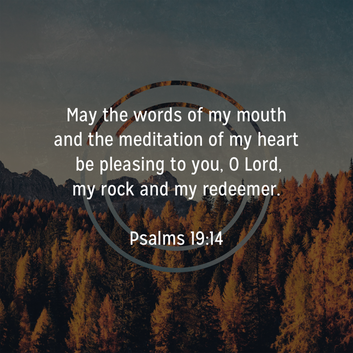|
Good morning!
We're so glad you decided to join us today!
If you haven't joined us in person, we are now meeting for Sunday School after the worship service!
When we meet in person, we take time to share our joys and concerns. Consider your past week. If you have any prayer requests, you can add them as a comment on this post. When you are ready, use the prayer below (source) to get started.
Dear Father,
Thank you for redeeming us. You took us out of deadness and gave us life. You made us alive together with Christ. You cancelled the debts that we owed you because of our sinfulness. You disarmed the powers that work against us, triumphing over them in Christ for our sake. How gracious and wonderful you are. To you we owe eternal praise. Help us to withstand anyone who might seek to disqualify us, seeking to bind us to any principle of action at all except faith in Jesus Christ, for he is the head, and he determines how the body will grow. Help us to hold fast to Christ, who is our head, in whose name I pray. Amen.
Today's lesson is on Colossians 2:16-23.
Lesson Context
Paul wrote the epistle of Colossians in the first half of the AD 60's, probably while he was under arrest in Rome. The recipients of the letter were a community of believers in Colossae, a city in modern Turkey. The letter was intended to encourage the Colossians and address false teachings that had infiltrated the church. The exact nature of the false teaching is unknown. However, based on the contents of the letter, scholars assume that both Jewish and pagan teaching threatened to lead believers astray. This syncretistic belief system was one composed of elements of different religious and philosophical traditions, probably including Judaism.
Troubling Judgment (verses 16-19)
The Law of Moses, part of our Old Testament, had a lot of regulations for the Jewish people. These included what was not allowed to be eaten, what people were not allowed to drink, and required religious celebrations. The Jewish calendar is based on the lunar cycle, so a New Moon marks a new month. First century churches in Rome and Galatia encountered conflict regarding these regulations and observances. Paul rejected such regulations because they would cause division and destruction. Believers should serve others with love, rather than chase appearances of holiness that disregard love. Out of this consideration and love for others, believers may limit their freedom to avoid causing other believers to sin. But the Law of Moses and its requirements are temporary, and cannot offer salvation. Christ is the culmination of all requirements for salvation. The things that were to come is Paul describing salvation in and through Christ. Paul commanded the Colossians to live with humility. The Colossians seem to have developed some sense of false humility. Our book suggests that this may be something like public fasting. The "worship of angels" is also a bit vague. It may mean that the Colossians were worshipping angels to intercede with God. The Colossians were in danger of being deceived and led astray by false teaching. Their deception would result in their being disqualified from receiving the reward of a life submitted to God's rule. Extreme practices of self-denial can sometimes result in a dramatic, and very unhealthy, physical response, like a hallucination. Based on the public fasting, some false teachers in Colossae were likely experiencing such denial-induced hallucinations. These would have seemed like visions and religious experiences. Instead of actually listening to God as the source of wisdom, they sought worldly wisdom that fed the idle desires of their flesh. Paul compared the church to the body of Christ. The church in Colossae was losing its connection to the head of the church, Christ.
Worldly Rules (verses 20-23)
Although the Colossian believers lived in the world, they were not to submit to its rules. This manner of living described their old life. However, they had died to that way of life. Instead, they had been raised into a new life through Christ's death and resurrection. As a result of their new life, they would reorient their hearts toward heavenly things and live as God's chosen people. Paul again talks about bad rules for the people. Rules that come from people will eventually perish and no longer apply. However, some rules can lead to growth and maturity in a person's spiritual health. Adherence to these practices does not reliably indicate the status of a person's heart toward God. True wisdom comes from knowledge of God's will rather than through misdirected worship. This misdirected worship could include worshipping the created and not the Creator, or displays of self-denial that result in harsh treatment of the body. God freely gifts knowledge of his will to his people. He wants his people to share this wisdom with others.
Conclusion
It can be tempting to believe that we don't add anything extra to our faith. Yet, the reality is that we often do. Sometimes, we set explicit or implicit rules on ourselves and, by extension, on other believers. Our observance of these rules or guidelines does not mean that our hearts are automatically more or less holy. But issues arise if we raise these rules to the same level as God's Word. We or other believers may be spiritually harmed. We should carefully examine our behavior regarding such regulations. Ensure that you first maintain a relationship with Christ, the head of the church. What, after all, can be added to the gospel of salvation through Christ? What more do we need? Only when we accept that Christ's work has accomplished what we needed for reconciliation can we be filled with his wisdom. Ask for the Spirit's guidance to discern whether you are following the world's wisdom or God's wisdom. At the Spirit's leading, we will be free to engage in practices that lead to the glory of God and the edification of other believers. Seek the Head! And heed the Spirit.
Prayer
Heavenly Father, we want wisdom that only you can give. Soften our hearts so we can be attentive to the work of your Spirit. Guide us to follow your will. May we, as the body, always remain attached to Christ. In Jesus' name. Amen.
Questions for Discussion
Benediction
This week's benediction is from the New Living Translation.
Next week's lesson will be on 1 Corinthians 10:23-11:1.
0 Comments
Leave a Reply. |
AuthorWe are a small, rural Presbyterian church in southwestern Pennsylvania. Archives
July 2024
Categories
All
|



 RSS Feed
RSS Feed